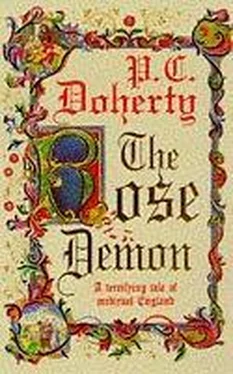Paul Doherty - The Rose Demon
Здесь есть возможность читать онлайн «Paul Doherty - The Rose Demon» весь текст электронной книги совершенно бесплатно (целиком полную версию без сокращений). В некоторых случаях можно слушать аудио, скачать через торрент в формате fb2 и присутствует краткое содержание. Жанр: Исторический детектив, на английском языке. Описание произведения, (предисловие) а так же отзывы посетителей доступны на портале библиотеки ЛибКат.
- Название:The Rose Demon
- Автор:
- Жанр:
- Год:неизвестен
- ISBN:нет данных
- Рейтинг книги:5 / 5. Голосов: 1
-
Избранное:Добавить в избранное
- Отзывы:
-
Ваша оценка:
- 100
- 1
- 2
- 3
- 4
- 5
The Rose Demon: краткое содержание, описание и аннотация
Предлагаем к чтению аннотацию, описание, краткое содержание или предисловие (зависит от того, что написал сам автор книги «The Rose Demon»). Если вы не нашли необходимую информацию о книге — напишите в комментариях, мы постараемся отыскать её.
The Rose Demon — читать онлайн бесплатно полную книгу (весь текст) целиком
Ниже представлен текст книги, разбитый по страницам. Система сохранения места последней прочитанной страницы, позволяет с удобством читать онлайн бесплатно книгу «The Rose Demon», без необходимости каждый раз заново искать на чём Вы остановились. Поставьте закладку, и сможете в любой момент перейти на страницу, на которой закончили чтение.
Интервал:
Закладка:
Later that day the army camped in open fields. Within a matter of hours, fires were lit, pavilions set up, whilst men-at-arms foraged to make bothies, small, tent-like structures made of branches woven together. Stolen cattle and sheep were slaughtered. The air grew thick with burning meat and the smell of horse dung and the fetid smells from the latrines, which had been hastily dug by the side of a stream. So far the rebel host was in good mood. Guards were set but, for the rest, it was like a fair or carnival.
Matthias decided to ride round the camp. He made his way through the horse lines, past the outlying sentries. He was going downhill when he heard a sound behind him. He reined in and looked round: through the trees at the top of the hill he saw horsemen shadowing him. Matthias shrugged and rode back to camp, remembering Fitzgerald’s warning.
The march continued. The army struggled out, sending up clouds of dust as it wound its way through the country lanes. Fitzgerald’s words proved prophetic: as they moved away from the coast and began to reach outlying farms and villages, burning and looting took place. Plumes of black smoke rose to the sky. De la Pole did his best to keep order, and when the army came upon a farmstead pillaged by some of the Irish kerns, the entire group of perpetrators was rounded up. The next morning the army had to march past the makeshift scaffolds set up on either side of the road where two dozen corpses, naked except for their loin cloths, twitched and twirled in the early morning breeze.
Eventually they climbed the hilly ridge of the Pennines, open moorland, gorse and heather turning purple under the warm summer sun. They saw nothing except hunting kestrels, petrels, crows and ravens, which circled noisily over their line of march. Supplies began to run out, the scouts had to forage even further, and sometimes they would march and not see a stream or well to slake their thirst. The heat grew oppressive, the rebels’ pace slowed, and the household marshals had to impose even more ruthless discipline. Arms were taken out of the carts and, because no one knew where the Tudor army was, they had to be ready at a moment’s notice to form in columns and fight a pitched battle. The scouts and spies informed their leaders of two armies moving slowly north to meet them: the first under John de Vere, Earl of Oxford; the second under Henry Tudor himself.
Matthias rode with Fitzgerald and Mairead just behind the banners of the principal commanders. They grew too tired to talk or even speculate on what might happen. At last, to their relief, they crossed the Pennines.
A few more men joined them under Lord Scrope of Masham. The leaders took counsel with him and decided to advance on York, only to be driven off by a hail of arrows from the citizens.
De la Pole decided to continue south. His army now numbered some eight thousand men, and scouts were bringing in news by the hour. The Tudor army was close, marching towards Nottingham. King Henry had been joined by Lord Strange, but morale in the royal camp was low. De la Pole decided to press on and, on the morning of 15 June, the news arrived that the armies were so close, it would only be a matter of hours before they met in pitched battle.
That evening, the rebel army breasted a hill and saw beneath them, snaking through the fields, the broad glittering River Trent as it wound its way past the small village of East Stoke towards Newark. De la Pole, Schwartz and Lovell went out to inspect the lie of the land. When they arrived back, cursitors were sent out along the army of march. The place had been chosen. De la Pole had decided to fight, putting his army on a ridge with the Trent protecting his rear and right flank. Camp was pitched late at night.
Matthias, exhausted and wondering what the next day would bring, hobbled his horse and, taking his blankets, chose a spot and fell immediately asleep.
He was awoken before dawn by Fitzgerald kicking his boot. Mairead stood smiling down at him.
‘This is the day, Matthias.’ She pulled a face. ‘Break your fast, then it’s-’
‘Each man to his post,’ Fitzgerald finished.
Matthias got to his feet. He felt cold and aching. He rubbed his arms and stared round: a thick river mist now covered the camp. The sound of the horses neighing, the clatter of arms, the shouts of the marshals shattered the silence. Campfires were lit, the smell of oatmeal drifted through the air.
‘Do you want a priest?’ Mairead asked.
Matthias walked away. He stared down the hill where the mist swirled. He reflected on what Mairead had asked. He fought hard to curb the rage boiling within him. On this day he might die, and what had been his life? His childhood had been shattered, his youth and upbringing overshadowed by a secret which hung over him like a black cloud. Now it had returned and brought him here in the middle of a cold, damp field. What did it matter if de la Pole and Symonds won today?
‘Do you know, Mairead,’ Matthias said, coming back, ‘I believe in the Good Lord but I do wonder whether He believes in me.’
He saw the tears in her eyes. She put her arms round his neck and kissed him on each cheek.
‘Come on,’ she whispered. ‘What is life anyway, Matthias, but the throw of dice? And, if we are to die, let’s do it on full bellies!’
Fitzgerald came over. Mairead stood back and the Irishman clasped Matthias’ hand.
‘We’ll be in the centre. Stay close to me, Matthias, whatever happens.’
They went to one of the fires where Mairead begged bowls of oatmeal. Fitzgerald wandered off and brought back some wine. After he had eaten Matthias felt better. Mairead kissed him goodbye.
‘I’ll be in the rear with the baggage train.’ She grinned, her fingers ran softly down his cheek, her lower lip quivered. ‘Perhaps, Matthias,’ she whispered, ‘the next time the wheel of life turns, we will meet again.’ And, with no more words, she ran off.
‘She’s a great lass.’ Fitzgerald linked his arm through Matthias’. ‘Today’s a dying day.’
He took Matthias over to one of the armourer’s carts. One of the marshals handed over a boiled leather breast-plate and a heavy steel sallet, which covered the top half of Matthias’ face.
‘Don’t wear any colours,’ Fitzgerald whispered. ‘If things go wrong. .’
The mist was lifting, the air was rent by the sound of trumpets and war horns. The army was on the move. Fitzgerald led Matthias over to where the standards were grouped on the brow of the hill: Lincoln’s, Lovell’s, the Kildares of Ireland, the royal arms of England. Edward of Warwick sat on a white palfrey. He was already accoutred for battle; wearing the silver armour the Archbishop of Dublin had bought him, now covered with a gorgeous blue, red and gold surcoat. Beside him sat Symonds, in the armour of a knight. The former priest had grown even fatter so he looked like a bloated toad. His resentment at being excluded from the military preparations was more than obvious. Lincoln, Schwartz and Lovell stood to one side, surrounded by officers and messengers. Behind them the Swiss and German mercenaries were taking up position: line after line, their tall pikes readied, their faces protected by sallets, many of which sported brilliant plumes of feathers.
As the sun strengthened, Matthias could see the rest of the army taking up position under the direction of marshals: these waved their white wands and moved up and down the ranks, accompanied by trumpeters and young boys beating on tambours. Fires were extinguished, carts rolled away. Matthias caught the excitement of thousands of men preparing for bloodshed — the neigh of horses, the clatter of arms, the shouts of the marshals and the persistent screaming of trumpets. Scouts and cursitors came riding up the hill, their horses covered in a white foam. They slipped from the saddle and hastened to tell their commanders what they had seen. The enemy was on the move and Matthias heard the distant sound of enemy trumpets.
Читать дальшеИнтервал:
Закладка:
Похожие книги на «The Rose Demon»
Представляем Вашему вниманию похожие книги на «The Rose Demon» списком для выбора. Мы отобрали схожую по названию и смыслу литературу в надежде предоставить читателям больше вариантов отыскать новые, интересные, ещё непрочитанные произведения.
Обсуждение, отзывы о книге «The Rose Demon» и просто собственные мнения читателей. Оставьте ваши комментарии, напишите, что Вы думаете о произведении, его смысле или главных героях. Укажите что конкретно понравилось, а что нет, и почему Вы так считаете.












